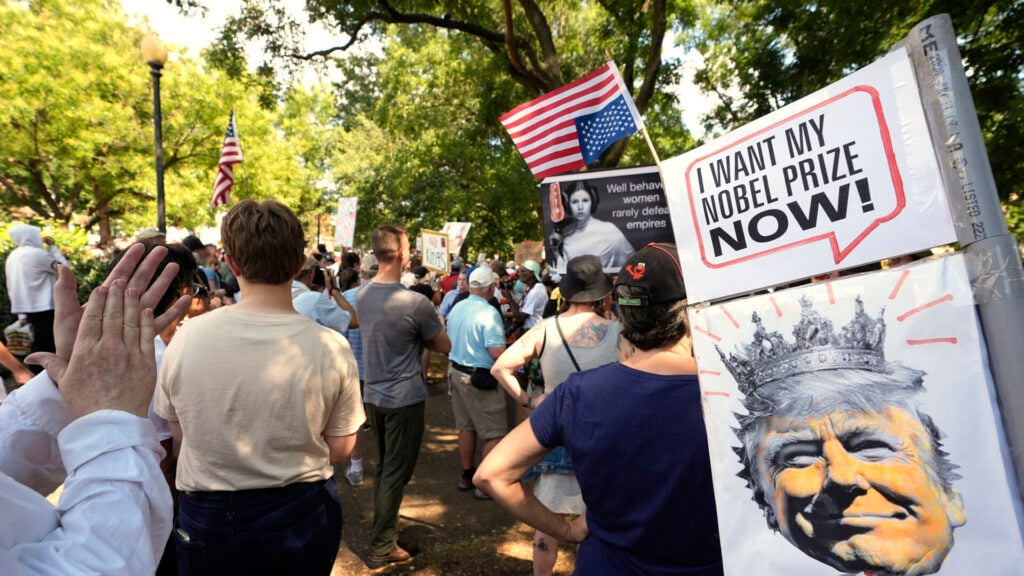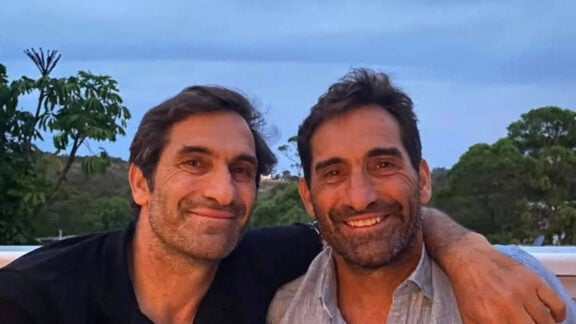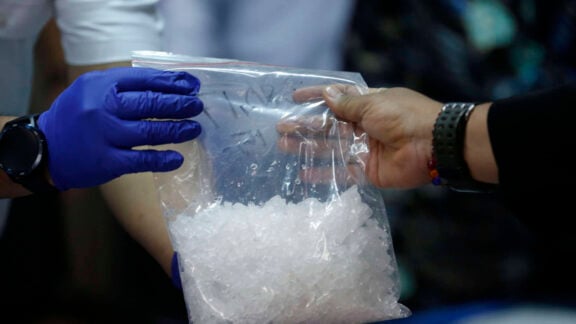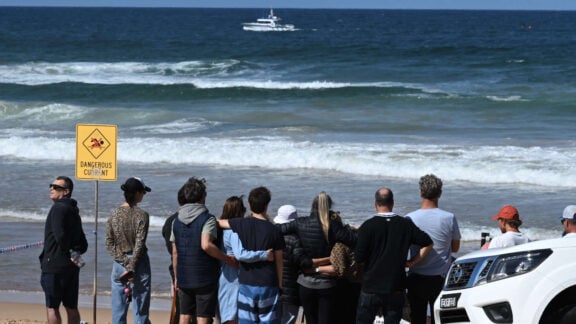President Donald Trump’s attempts to solve the Ukraine war, including by rolling out the red carpet for Vladimir Putin in Alaska, and (initially publicly humiliating) pressuring Ukraine’s Volodymyr Zelenskyy to offer concessions are both unlikely to deliver peace anytime soon. POTUS’ efforts to stop the war in Gaza, return the hostages and disarm Hamas are likewise elusive.
Trump’s claim to have delivered six peace deals won’t deliver him the Nobel. These ‘peace deals’ are at best temporary ceasefires, or involved limited, or no US involvement.
Trump made headway in his efforts to broker peace between Armenia and Azerbaijan, though it fell short of achieving a definitive agreement. This limited success in Armenia- Azerbaijan is not enough for a Nobel.
China shifts the World Order
Trump’s goal of a Nobel prize seems even more distant as China steps up its claim to be the alternative world military power rivalling the US’s military might.
The Military Might Spectacular parading through Beijing last week, revealed as much about a ‘new world order’ as the goose-stepping soldiers and endless waves of missiles on display. It also provided solace to the world’s anti- Western dictators – Kim Jong Un, Putin, the leaders of Iran, Belarus, and others. Worse for the US and Australia, the reemergence of India and Russia’s camaraderie, (not seen since the 1970s)—is a concern fueled by Trump’s imposition of 50 per cent tariffs on India for trading in oil with Russia. The performance last week in Beijing is a graphic example that peace may not come easily in the world’s hotspots .
Cyprus: Trump’s path to a Nobel-worthy peace
If President Trump wants a sure-fire way to the Nobel, he could try to resolve the longstanding Turkish, Greek Cypriot Conflict. This would, in my mind, deliver him the Nobel prize.
Prominent Republican lawmakers in the US have understood the pivotal role Trump can play and urged him to act on Cyprus. In 2025, Republican US Congressional representatives Nicole Malliotakis and Gus Bilirakis, successfully moved that President Trump make the resolution of the Cyprus problem a top foreign policy priority.
The forced division of Cyprus into a predominantly Greek South and Turkish North occurred with the invasion of the island by Turkey 51 years ago. Cyprus is now the only country with a Berlin type wall dividing its capital, a UN monitored buffer zone, and 30,000 Turkish troops permanently stationed in the North.
Multiple attempts to resolve the Cyprus conflict have failed, and it is now clear that the agreement of Turkey is critical to a resolution. That’s why in May 2025, a group of 22 U.S. Congress Representatives asked President Trump to raise the Cyprus issue directly with Turkish President Erdoğan.
Peace in Cyprus would not only secure a Nobel Peace prize, but it would also highlight his success against the failures of Presidents Obama and Biden.
The Obama and Biden administrations both promised the American Greek Community that they would act to resolve the Cyprus issue. They both talked a lot about supporting the UN proposals but they both failed to deliver a resolution.
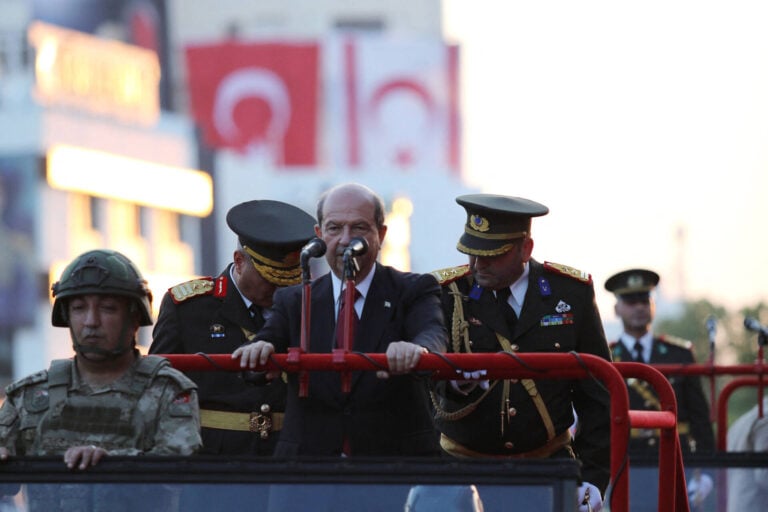
Trump’s historic links to Cyprus
Trump already has a history in relation to Cyprus. The first Trump administration deepened cooperation with the Internationally recognised Cyprus Government in the South in areas like security, counterterrorism, and energy. This included signing the Eastern Mediterranean Security and Energy Partnership Act of 2019, which enhanced collaboration between the U.S., Cyprus, Greece, and Israel.
The new Turkish missile installations on the island are of special concern to Israel given Turkey’s very strong pro Palestine stance. The Israel Lobby in the US is certain to support a resolution given these concerns.
An increasing number of Congressional Republicans thus see the resolution of the Cyprus dispute as important for regional stability and U.S. strategic interests in the Eastern Mediterranean including for its defence of Israel. At a political level they also know that the resolution of the Cyprus issue would galvanise the support of Greek (and potentially Turkish) Americans for the Trump administration.
In Australia, as President of the Cyprus Community of Melbourne and Victoria, I have tried to bring the Greek and Turkish Cypriot communities closer together to demonstrate our capacity to live harmoniously. We recognise that whilst the Turkish invasion led to many deaths and displaced 200,000 Greek Cypriots from their homes in the North, it has also had a devastating effect on Turkish Cypriots. They have suffered economic stagnation in the North. The unique Turkish Cypriot culture is in danger of disappearing altogether under the weight of immigrant Turkish settlers brought in by the Erdogan administration who now outnumber them.
In Cyprus, recently I met a former Turkish Cypriot MP from the North in the buffer zone. He was on the negotiating team that came tantalisingly close to a resolution in UN sponsored talks in Crans Montana. He remains committed to a solution that reunites and demilitarizes Cyprus. I have invited him to Melbourne to address a gathering of Greek and Turkish Cypriots. These initiatives are important, but alone they cannot bring peace to Cyprus.
Trump has shown a roadmap as illustrated in direct American intervention in Armenia Azerbaijan to bring about peace. I visited Armenia and saw firsthand the devastating consequences of the 2020 war that saw Armenia lose the Nagorno-Karabakh territory to Azerbaijan with the loss of 5000 young Armenian lives and the forced displacement of 100,000 ethnic Armenians. Armenia’s reliance on military support from Russia at that crucial time was devastatingly flawed. While Azerbaijan’s armament by Turkey was decisive.
The Trump administration correctly recognised that the main stumbling block to a resilient peace was to satisfy Azerbaijan’s need for a land corridor to its Southern territory. Rather than acquire this through further armed conflict Azerbaijan and Armenia were convinced to accept a US administered corridor to secure peace.
A real roadmap: US guarantees and regional stability
But, back to Cyprus. This intractable conflict can only be resolved by bringing Turkey and Greece alongside Greek and Turkish Cypriots to the table. It will require US and British security guarantees to safeguard both Greek and Turkish Cypriots. It will require agreement by both Greece and Turkey to give up intervention rights in Cyprus under previous agreements. And it will require concluding a just settlement based on UN proposals for a Bizonal, Bicommunal Federation.
It would also include accelerated efforts to establish a strong US military presence in the Paphos area of Cyprus to add to the British military bases to provide increased regional stability alongside Cyprus security. And it would be a giant step in bringing Greece and Turkey into a lasting historical peace within a Western umbrella.
I am certain that Greeks and many Turks the world over would congratulate Trump and support Nobel Peace Prize recognition for achieving peace where countless others have failed. Trump just needs to act.
*Theo Theophanous is a regular commentator for Neos Kosmos, a former Labor Government Minister in Victoria, and President of the Cyprus Community of Melbourne and Victoria.
